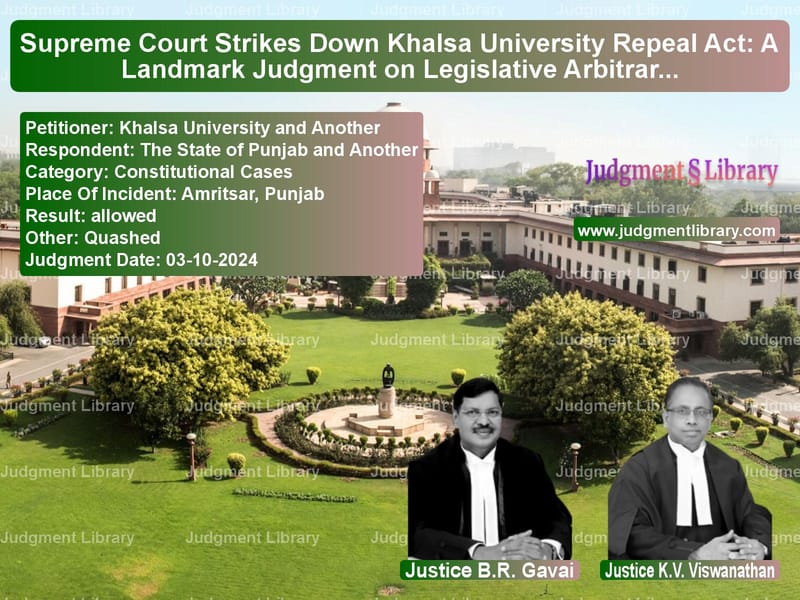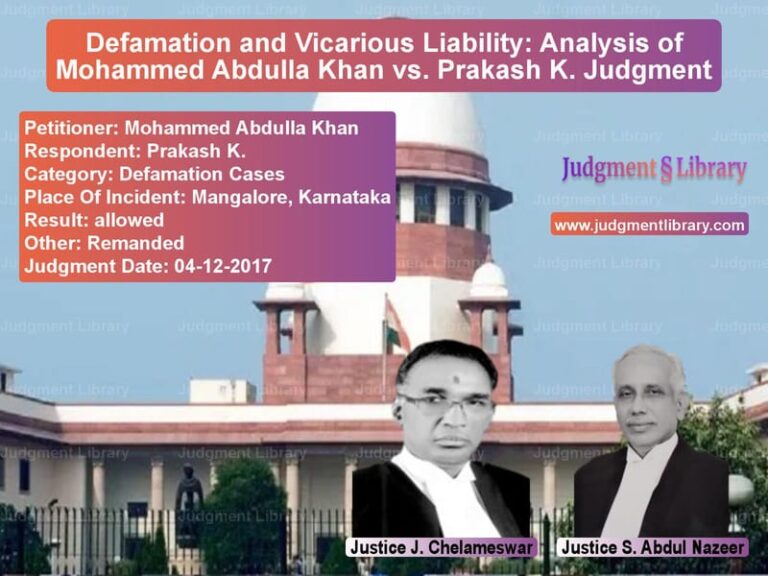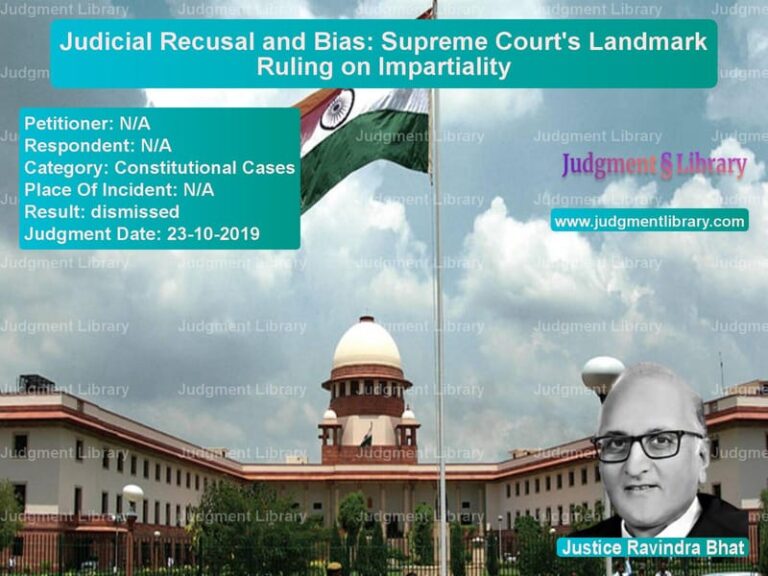Supreme Court Strikes Down Khalsa University Repeal Act: A Landmark Judgment on Legislative Arbitrariness
The case of Khalsa University and Another vs. The State of Punjab and Another is a landmark judgment dealing with the principles of legislative arbitrariness and equal protection under the law. The case arose when the State of Punjab enacted The Khalsa University (Repeal) Act, 2017, which revoked the establishment of Khalsa University, Amritsar. The appellants, including Khalsa University and Khalsa College Charitable Society, challenged this repeal, arguing that it was discriminatory, arbitrary, and violative of Article 14 of the Indian Constitution. The Supreme Court ultimately ruled in favor of the appellants, striking down the repeal act as unconstitutional.
Background of the Case
In 2010, the Punjab government introduced the Punjab Private Universities Policy to encourage the establishment of self-financed universities. The Khalsa College Charitable Society, which had been in existence since 1892, proposed the creation of Khalsa University under this policy. The government approved this proposal and enacted The Khalsa University Act, 2016, formally recognizing the university.
Following this, the university began functioning and admitted students in 26 academic programs for the 2016-17 session. However, in 2017, after a change in the state government, the Punjab government abruptly repealed the 2016 Act through an ordinance, which was later ratified as The Khalsa University (Repeal) Act, 2017. The stated reason for this repeal was to “protect the heritage character of Khalsa College.”
Petitioners’ Arguments
- The repeal act was arbitrary, discriminatory, and violated Article 14 of the Constitution.
- The repeal was politically motivated, as the new Chief Minister, Captain Amarinder Singh, had publicly opposed the establishment of Khalsa University while he was in the opposition.
- Out of the 16 private universities established under the 2010 policy, only Khalsa University was targeted for repeal, demonstrating clear discrimination.
- Khalsa College and Khalsa University were distinct entities, and the university did not threaten the heritage status of Khalsa College.
- Students already enrolled at the university were left in a difficult situation due to the abrupt repeal.
Respondents’ Arguments
- The repeal act was a valid legislative decision aimed at preserving the heritage character of Khalsa College.
- Khalsa College had earned a special status over time, and the university’s establishment could dilute its historical significance.
- The state has the power to repeal laws when necessary, and the university had no vested right in its continued existence.
- Alternative arrangements were made for students affected by the repeal, ensuring their academic interests were protected.
Supreme Court’s Observations
- The Court emphasized that laws must be reasonable and cannot arbitrarily single out one institution while allowing others to function.
- The State of Punjab failed to justify why only Khalsa University was being repealed while other private universities established under the same policy continued to operate.
- Political motivations cannot be the basis for enacting or repealing laws.
- The claim that Khalsa University threatened the heritage character of Khalsa College was unsubstantiated.
- The state government did not provide sufficient justification for repealing the university’s recognition.
Supreme Court’s Ruling
- The Supreme Court struck down The Khalsa University (Repeal) Act, 2017, declaring it unconstitutional.
- The original Khalsa University Act, 2016, was reinstated.
- The state government was directed to ensure the university resumed operations as per its previous legal status.
Legal Implications of the Judgment
The Supreme Court’s ruling is significant for several reasons:
- Protection Against Arbitrary Legislative Action: The judgment reaffirms that state governments cannot arbitrarily repeal laws without sound justification.
- Reinforcement of Article 14: The ruling strengthens the constitutional guarantee of equality before the law and protection against discrimination.
- Judicial Oversight on Policy Reversals: Governments cannot reverse policies arbitrarily, especially when they affect fundamental rights and legitimate expectations.
Conclusion
The Supreme Court’s decision in this case upholds the principles of fairness, equality, and non-arbitrariness in legislative actions. By striking down The Khalsa University (Repeal) Act, 2017, the Court has sent a strong message that laws must be enacted and repealed based on rational considerations rather than political motivations.
Petitioner Name: Khalsa University and Another.Respondent Name: The State of Punjab and Another.Judgment By: Justice B.R. Gavai, Justice K.V. Viswanathan.Place Of Incident: Amritsar, Punjab.Judgment Date: 03-10-2024.
Don’t miss out on the full details! Download the complete judgment in PDF format below and gain valuable insights instantly!
Download Judgment: khalsa-university-an-vs-the-state-of-punjab-supreme-court-of-india-judgment-dated-03-10-2024.pdf
Directly Download Judgment: Directly download this Judgment
See all petitions in Fundamental Rights
See all petitions in Constitution Interpretation
See all petitions in Legislative Powers
See all petitions in Public Interest Litigation
See all petitions in Judgment by B R Gavai
See all petitions in Judgment by K.V. Viswanathan
See all petitions in allowed
See all petitions in Quashed
See all petitions in supreme court of India judgments October 2024
See all petitions in 2024 judgments
See all posts in Constitutional Cases Category
See all allowed petitions in Constitutional Cases Category
See all Dismissed petitions in Constitutional Cases Category
See all partially allowed petitions in Constitutional Cases Category







